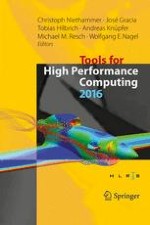This book presents the proceedings of the 10th International Parallel Tools Workshop, held October 4-5, 2016 in Stuttgart, Germany – a forum to discuss the latest advances in parallel tools.
High-performance computing plays an increasingly important role for numerical simulation and modelling in academic and industrial research. At the same time, using large-scale parallel systems efficiently is becoming more difficult. A number of tools addressing parallel program development and analysis have emerged from the high-performance computing community over the last decade, and what may have started as collection of small helper script has now matured to production-grade frameworks. Powerful user interfaces and
